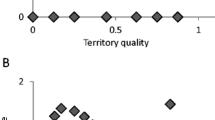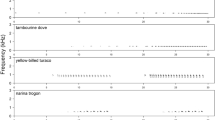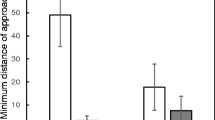Abstract
Whether novel traits involved in animal communication are favored or not by social selection depends on how receivers respond to them. If alternative traits arise at different locations or the same traits are perceived differently, then populations may diverge even when occupying similar environments. Aggressiveness towards bearers of novel versus familiar traits is informative about how male-male competition may drive phenotypic evolution, yet few studies have tested the function of signaling traits in social selection across populations. We assessed the role of a black pectoral band during territorial contests in two allopatric species of Neotropical passerine birds in the genus Arremon either having or lacking this plumage trait. Field experiments using taxidermic mounts and playback of conspecific songs revealed that males of both species were equally aggressive towards phenotypes bearing or lacking a pectoral band. Although evaluating physiological and social costs of bearing alternative traits and assessing female preferences is required to further examine the roles of social and sexual mechanisms in the evolution of plumage and geographic variation, our results indicate that social selection via male-male interactions is an unlikely driver of phenotypic divergence among populations of Arremon.
Significance
Social selection via intrasexual competition for resources may drive phenotypic divergence and population differentation in animals, but few studies have tested predictions of this hypothesis by examining how alternative traits varying geographically are perceived in contexts of male-male competition. We assessed the behavioral response of territorial males in two species of Neotropical songbirds to taxidermic mounts having or lacking a black pectoral band, a geographically variable plumage trait. Irrespective of their own phenotype, males of both species were similarly aggressive to potential intruders bearing or lacking the pectoral band. In contrast with work suggesting male-male interactions may mediate trait evolution, our results indicate that pectoral bands in this system are unlikely targets of social selection via contests in which males compete for territories, and call for studies assessing long-term costs of bearing alternative traits or female choice as selective forces driving phenotypic evolution.



Similar content being viewed by others
Data availability
All data sets generated and/or analyzed during the current study are available at https://www.researchgate.net/publication/345313882_Raw_data_Arremon
References
Abolins-Abols M, Kornobis E, Ribeca P, Wakamatsu K, Peterson MP, Ketterson ED, Milá B (2018) Differential gene regulation underlies variation in melanic plumage coloration in the dark-eyed junco (Junco hyemalis). Mol Ecol 27:4501–4515. https://doi.org/10.1111/mec.14878
Akçay Ç, Anderson RC, Nowicki S, Beecher MD, Searcy WA (2015) Quiet threats: Soft song as an aggressive signal in birds. Anim Behav 105:267–274. https://doi.org/10.1016/j.anbehav.2015.03.009
Andersson M (1994) Sexual Selection, 1st edn. Princeton University Press, Princeton, NJ
Andersson M (1982) Female choice selects for extreme tail length in a widowbird. Nature 299:818–820. https://doi.org/10.1038/299818a0
Arnott G, Elwood RW (2009) Assessment of fighting ability in animal contests. Anim Behav 77:991–1004. https://doi.org/10.1016/j.anbehav.2009.02.010
Ayerbe-Quiñones F (2019) Guía ilustrada de la avifauna colombiana, Second edi. Wildlife Conservation Society / Colombia Program, Colombia
Baker MC, Baker AEM (1990) Reproductive behavior of female buntings: Isolating mechanisms in a hybridizing pair of species. Evolution 44:332–338. https://doi.org/10.2307/2409411
Baldassarre DT, Webster MS (2013) Experimental evidence that extra-pair mating drives asymmetrical introgression of a sexual trait. Proc R Soc B 280:20132175. https://doi.org/10.1098/rspb.2013.2175
Basolo AL (1990) Female preference predates the evolution of the sword in swordtail fish. Science 250:808–810. https://doi.org/10.1126/science.250.4982.808
Bates D, Maechler M, Bolker B, Walker S (2014) lme4. Linear mixed-effects models using Eigen and S4. R package version 1:1–7
Botero CA, Pen I, Komdeur J, Weissing FJ (2010) The evolution of individual variation in communication strategies. Evolution 64:3123–3133. https://doi.org/10.1111/j.1558-5646.2010.01065.x
Briffa M, Sneddon LU, Wilson AJ (2015) Animal personality as a cause and consequence of contest behaviour. Biol Lett 11:20141007. https://doi.org/10.1098/rsbl.2014.1007
Burley N, Coopersmith CB (1987) Bill color preferences of zebra finches. Ethology 76:133–151. https://doi.org/10.1111/j.1439-0310.1987.tb00679.x
Burley N, Krantzberg G, Radman P (1982) Influence of colour-banding on the conspecific preferences of zebra finches. Anim Behav 30:444–455. https://doi.org/10.1016/S0003-3472(82)80055-9
Burley N, Symanski R (1998) “A taste for the beautiful”: Latent aesthetic mate preferences for white crests in two species of australian grassfinches. Am Nat 152:792–802. https://doi.org/10.1086/286209
Cadena CD, Cheviron ZA, Funk WC (2011) Testing the molecular and evolutionary causes of a “leapfrog” pattern of geographical variation in coloration. J Evol Biol 24:402–414. https://doi.org/10.1111/j.1420-9101.2010.02175.x
Cadena CD, Cuervo AM (2010) Molecules, ecology, morphology, and songs in concert: How many species is Arremon torquatus (Aves: Emberizidae)? Biol J Linn Soc 99:152–176. https://doi.org/10.1111/j.1095-8312.2009.01333.x
Castaño MI, Cadena CD, Avendaño JE (2019) Home-range size of an Andean bird: Assessing the role of physical condition. Biotropica 51:591–599. https://doi.org/10.1111/btp.12673
Chapin KJ, Peixoto PEC, Briffa M (2019) Further mismeasures of animal contests: A new framework for assessment strategies. Behav Ecol 30:1177–1185. https://doi.org/10.1093/beheco/arz081
Chapman FM (1923) Mutation among birds on the Genus Buarremon. B Am Mus Nat Hist 48:243–278
Colegrave N, Ruxton GD (2003) Confidence intervals are a more useful complement to nonsignificant tests than are power calculations. Behav Ecol 14:446–447. https://doi.org/10.1093/beheco/14.3.446
Demko AD, Mennill DJ (2018) Male and female signaling behavior varies seasonally during territorial interactions in a tropical songbird. Behav Ecol Sociobiol 72:84. https://doi.org/10.1007/s00265-018-2495-5
Dijkstra PD, Seehausen O, Groothuis TGG (2005) Direct male-male competition can facilitate invasion of new colour types in Lake Victoria cichlids. Behav Ecol Sociobiol 58:136–143. https://doi.org/10.1007/s00265-005-0919-5
Dunn PO, Garvin JC, Whittingham LA, Freeman-Gallant CR, Hasselquist D (2010) Carotenoid and melanin-based ornaments signal similar aspects of male quality in two populations of the common yellowthroat. Funct Ecol 24:149–158. https://doi.org/10.1111/j.1365-2435.2009.01606.x
Fedy BC, Stutchbury BJM (2005) Territory defence in tropical birds: Are females as aggressive as males? Behav Ecol Sociobiol 58:414–422. https://doi.org/10.1007/s00265-005-0928-4
Filardi CE, Smith CE (2008) Social selection and geographic variation in two Monarch flycatchers from the Solomon Islands. Condor 110:24–34. https://doi.org/10.1525/cond.2008.110.1.24
Gluckman TL, Mundy NI (2016) Evolutionary pathways to convergence in plumage patterns. BMC Evol Biol 16:172. https://doi.org/10.1186/s12862-016-0741-x
Graves GR (1985) Elevational correlates of speciation and intraspecific geographic variation in plumage in Andean forest birds. The Auk 102:556–579. https://doi.org/10.1093/auk/102.3.556
Greig E, Baldassarre D, Webster M (2015) Differential rates of phenotypic introgression are associated with male behavioral responses to multiple signals. Evolution 69:2602–2612. https://doi.org/10.1111/evo.12756
Griffith SC, Parker TH, Olson VA (2006) Melanin- versus carotenoid-based sexual signals: Is the difference really so black and red? Anim Behav 71:749–763. https://doi.org/10.1016/j.anbehav.2005.07.016
Järvi T, Bakken M (1984) The function of the variation in the breast stripe of the great tit (Parus major). Anim Behav 32:590–596. https://doi.org/10.1016/S0003-3472(84)80296-1
Johnson WT, Freeberg TM (2016) Pseudoreplication in use of predator stimuli in experiments on antipredator responses. Anim Behav 119:161–164. https://doi.org/10.1016/j.anbehav.2016.07.006
Jones IL, Hunter FM (1998) Heterospecific mating preferences for a feather ornament in least auklets. Behav Ecol 9:187–192. https://doi.org/10.1093/beheco/9.2.187
Kirby KN, Gerlanc D (2013) BootES: An R package for bootstrap confidence intervals on effect sizes. Behav Res Methods 45:905–927. https://doi.org/10.3758/s13428-013-0330-5
Kirkpatrick M, Nuismer SL (2004) Sexual selection can constrain sympatric speciation. Proc R Soc Lond B 271:687–693. https://doi.org/10.1098/rspb.2003.2645
Krabbe NK (2008) Birds of the Sierra Nevada de Santa Marta. Colombia. Jhon V, Moore Nature Recordings, San Jose, CA, USA
Labocha MK, Hayes JP (2012) Morphometric indices of body condition in birds: A review. J Ornithol 153:1–22. https://doi.org/10.1007/s10336-011-0706-1
Laubach ZM, Blumstein DT, Romero LM, Sampson G, Foufopoulos J (2013) Are white-crowned sparrow badges reliable signals? Behav Ecol Sociobiol 67:481–492. https://doi.org/10.1007/s00265-012-1468-3
Lê S, Pagès J, Husson F (2008) FactoMineR : An R package for multivariate analysis. J Stat Softw 25:1–18. https://doi.org/10.18637/jss.v025.i01
Leimar O (2019) Game theory models of animal contests: are we at a standstill?: a comment on Chapin et al. Behav Ecol 30:1190–1191
Ligon RA, Diaz CD, Morano JL, Troscianko J, Stevens M, Moskeland A, Laman TG, Scholes E (2018) Evolution of correlated complexity in the radically different courtship signals of birds-of-paradise. PLoS Biol 16:e2006962. https://doi.org/10.1371/journal.pbio.2006962
McDonald DB, Clay RP, Brumfield RT, Braun MJ (2001) Sexual selection on plumage and behavior in an avian hybrid zone: Experimental tests of male-male interactions. Evolution 55:1443–1451. https://doi.org/10.1111/j.0014-3820.2001.tb00664.x
McNamara JM, Houston AI (2005) If animals know their own fighting ability, the evolutionarily stable level of fighting is reduced. J Theor Biol 232:1–6. https://doi.org/10.1016/j.jtbi.2004.07.024
Mendelson TC, Martin MD, Flaxman SM (2014) Mutation-order divergence by sexual selection: Diversification of sexual signals in similar environments as a first step in speciation. Ecol Lett 17:1053–1066. https://doi.org/10.1111/ele.12313
Miles MC, Fuxjager MJ (2018) Animal choreography of song and dance: a case study in the Montezuma oropendola, Psarocolius montezuma. Anim Behav 140:99–107. https://doi.org/10.1016/j.anbehav.2018.04.006
Mumme RL, Galatowitsch ML, Jabloński PG, Stawarczyk TM, Cygan JP (2006) Evolutionary significance of geographic variation in a plumage-based foraging adaptation: An experimental test in the slate-throated redstart (Myioborus miniatus). Evolution 60:1086–1097. https://doi.org/10.1111/j.0014-3820.2006.tb01185.x
Parra JL (2010) Color evolution in the hummingbird genus Coeligena. Evolution 64:324–335. https://doi.org/10.1111/j.1558-5646.2009.00827.x
Patten MA, Rotenberry JT, Zuk M (2004) Habitat selection, acoustic adaptation, and the evolution of reproductive isolation. Evolution 58:2144–2155. https://doi.org/10.1111/j.0014-3820.2004.tb01593.x
Peek FW (1972) An experimental study of the territorial function of vocal and visual display in the male red-winged blackbird (Agelaius phoeniceus). Anim Behav 20:112–118. https://doi.org/10.1016/S0003-3472(72)80180-5
Price-Waldman RM, Shultz AJ, Burns KJ (2020) Speciation rates are correlated with changes in plumage color complexity in the largest family of songbirds. Evolution 74:1155–1169. https://doi.org/10.1111/evo.13982
Price T (2008) Speciation in birds. Roberts and Company, Greenwood Village, CO
Price T (1998) Sexual selection and natural selection in bird speciation. Phil Trans R Soc B 353:251–260. https://doi.org/10.1098/rstb.1998.0207
Pryke SR, Lawes MJ, Andersson S (2001) Agonistic carotenoid signalling in male red-collared widowbirds: Aggression related to the colour signal of both the territory owner and model intruder. Anim Behav 62:695–704. https://doi.org/10.1006/anbe.2001.1804
Qvarnström A, Vallin N, Rudh A (2012) The role of male contest competition over mates in speciation. Curr Zool 58:493–509. https://doi.org/10.1093/czoolo/58.3.493
R Development Core Team (2016) R: A language and environment for statistical computing. R Foundation for Statistical Computing, Vienna
Rasband WS (2016) ImageJ. U.S.National Institutes Heal, Bethesda, USA
Ratcliffe LM, Grant PR (1983a) Species recognition in Darwin’s finches (Geospiza, Gould) I. Discrimination by morphological cues. Anim Behav 31:1139–1153. https://doi.org/10.1016/S0003-3472(83)80021-9
Ratcliffe LM, Grant PR (1983b) Species recognition in Darwin’s finches (Geospiza, Gould). II. Geographic variation in mate preference. Anim Behav 31:1154–1165. https://doi.org/10.1016/S0003-3472(83)80022-0
Réale D, Reader SM, Sol D, McDougall PT, Dingemanse NJ (2007) Integrating animal temperament within ecology and evolution. Biol Rev 82:291–318. https://doi.org/10.1111/j.1469-185X.2007.00010.x
Remsen JV (1984) High incidence of “leapfrog” pattern of geographic variation in Andean birds: Implications for the speciation process. Science 224:171–173. https://doi.org/10.1126/science.224.4645.171
Rising JD, Jaramillo A, Copete JL, Ryan PG, Madge SC (2011) Family emberizidae. In: del Hoyo J, Elliott A, Christie DA (eds) handbook of the birds of the world, tanagers to New World Blackbirds, vol 16. Lynx Edicions, Barcelona, Spain, pp 428–683
Rohwer S, Rohwer FC (1978) Status signalling in Harris Sparrows: Experimental deceptions achieved. Anim Behav 26:1012–1022. https://doi.org/10.1016/0003-3472(78)90090-8
Røskaft E, Rohwer S (1987) An experimental study of the function of the red epaulettes and the black body colour of male red-winged blackbirds. Anim Behav 35:1070–1077. https://doi.org/10.1016/S0003-3472(87)80164-1
Ryan MJ, Rand AS (1993) Sexual selection and signal evolution: the ghost of biases past. Phil Trans R Soc B 340:187–195. https://doi.org/10.1098/rstb.1993.0057
Safran RJ, Adelman JS, McGraw KJ, Hau M (2008) Sexual signal exaggeration affects physiological state in male barn swallows. Curr Biol 18:R461–R462. https://doi.org/10.1016/j.cub.2008.03.031
Savalli UM (1995) The evolution of bird coloration and plumage elaboration: a review of hypotheses. In: Power DM (ed) Current Ornithology. Plenum, New York, pp 141–190
Searcy WA, Beecher MD (2009) Song as an aggressive signal in songbirds. Anim Behav 78:1281–1292. https://doi.org/10.1016/j.anbehav.2009.08.011
Seddon N, Botero CA, Tobias JA, Dunn PO, MacGregor HEA, Rubenstein DR, Uy JAC, Weir JT, Whittingham LA, Safran RJ (2013) Sexual selection accelerates signal evolution during speciation in birds. Proc R Soc B 280:20131065. https://doi.org/10.1098/rspb.2013.1065
Senar JC (1999) Plumage coloration as a signal of social status. In: Adams NJ, Slotow RH (eds) Proceedings of the International Ornithological Congress. BirdLife South Africa, Johannesburg, pp 1669–1686
Senar JC (2006) Color displays as intrasexual signals of aggression and dominance. In: McGraw KJ (ed) Hill GE. Bird coloration. Harvard University Press, Cambridge, MA, pp 87–136
Stein AC, Uy JAC (2006) Unidirectional introgreesion of a sexually selected trait across an avian hybrid zone: A role for female choice? Evolution 60:1476–1485. https://doi.org/10.1554/05-575.1
Stuart-Fox DM, Firth D, Moussalli A, Whiting MJ (2006) Multiple signals in chameleon contests: designing and analysing animal contests as a tournament. Anim Behav 71:1263–1271. https://doi.org/10.1016/j.anbehav.2005.07.028
Tarof SA, Dunn PO, Whittingham LA (2005) Dual functions of a melanin-based ornament in the common yellowthroat. Proc R Soc Lond B 272:1121–1127. https://doi.org/10.1098/rspb.2005.3053
Tibbetts EA (2014) The evolution of honest communication: Integrating social and physiological costs of ornamentation. Integr Comp Biol 54:578–590. https://doi.org/10.1093/icb/icu083
Tibbetts EA, Safran RJ (2009) Co-evolution of plumage characteristics and winter sociality in New and Old World sparrows. J Evol Biol 22:2376–2386. https://doi.org/10.1111/j.1420-9101.2009.01861.x
Tobias JA, Montgomerie R, Lyon BE (2012) The evolution of female ornaments and weaponry: social selection, sexual selection and ecological competition. Phil Trans R Soc B 367:2274–2293. https://doi.org/10.1098/rstb.2011.0280
Tryjanowski P, Morelli F, Kwieciński Z, Indykiewicz P, Møller AP (2018) Birds respond similarly to taxidermic models and live cuckoos Cuculus canorus. J Ethol 36:243–249. https://doi.org/10.1007/s10164-018-0554-z
Uy JAC, Cooper EA, Cutie S, Concannon MR, Poelstra JW, Moyle RG, Filardi CE (2016) Mutations in different pigmentation genes are associated with parallel melanism in island flycatchers. Proc R Soc B 283:20160731. https://doi.org/10.1098/rspb.2016.0731
Uy JAC, Irwin DE, Webster MS (2018) Behavioral isolation and incipient speciation in birds. Annu Rev Ecol Evol S 49:1–24. https://doi.org/10.1146/annurev-ecolsys-110617-062646
Uy JAC, Moyle RG, Filardi CE (2009) Plumage and song differences mediate species recognition between incipient flycatcher species of the Solomon Islands. Evolution 63:153–164. https://doi.org/10.1111/j.1558-5646.2008.00530.x
van Dongen WFD, Mulder RA (2008) Male and female golden whistlers respond differently to static and dynamic signals of male intruders. Behav Ecol 19:1025–1033. https://doi.org/10.1093/beheco/arn061
Webster M, Ligon R, Leighton G (2018) Social costs are an underappreciated force for honest signalling in animal aggregations. Anim Behav 143:167–176. https://doi.org/10.1016/j.anbehav.2017.12.006
West-Eberhard MJ (1984) Sexual selection, competitive communication and species specific signals in insects. In: Lewis T (ed) Insect Communication. Academic Press, New York, pp 283–324
West-Eberhard MJ (1983) Sexual selection, social competition, and speciation. Q Rev Biol 58:155–183. https://doi.org/10.1086/413215
Winger BM, Bates JM (2015) The tempo of trait divergence in geographic isolation: Avian speciation across the Marañón Valley of Peru. Evolution 69:772–787. https://doi.org/10.1111/evo.12607
Witte K, Hirschler U, Curio E (2000) Sexual imprinting on a novel adornment influences mate preferences in the Javanese Mannikin Lonchura leucogastroides. Ethology 106:349–363. https://doi.org/10.1046/j.1439-0310.2000.00558.x
Acknowledgments
We thank the staff and forest owners at Floresta de la Sabana and the Sierra Nevada de Santa Marta, particularly to Martha Millán, Yurgen Vega and Jaime Bonilla for logistical support. María Isabel Castaño provided field assistance. J. Albert C. Uy, Adolfo Amézquita and Carlos Esteban Lara gave statistical assistance and advice about experimental design. We thank J. Albert C. Uy and four anonymous reviewers for helpful comments that greatly improved the manuscript.
Funding
This research was financially supported by the Programa Doctoral Becas Colciencias (Convocatoria 647), Animal Behaviour Society Developing Nations Award, E. Alexander Bergstrom Memorial Research Award of the Association of Field Ornithologists, François Vuilleumier Fund of the Neotropical Ornithological Society, and Beca Proyecto Semilla of the Facultad de Ciencias (Convocatorias 2017-1 and 2019-1).
Author information
Authors and Affiliations
Corresponding author
Ethics declarations
Conflict of interest
The authors have no conflict of interest.
Ethical approval
Field collecting techniques and experiments conducted in this research are approved by the Comité Institucional para el Cuidado y Uso de los Animales de Laboratorio CICUAL-UNIANDES. Mist-netting, banding and collection of specimens were authorized by the Autoridad Nacional de Licencias Ambientales of Colombia through the Permiso Marco de Recolección de Especímenes granted to the Universidad de los Andes (decretos 1177 de 2014 and 1386 de 2015). This research followed all ASAB/ABS guidelines for the treatment of animals in research as well as all applicable international, national, and/or institutional guidelines for the care and use of animals.
Additional information
Communicated by K. McGraw
Publisher’s note
Springer Nature remains neutral with regard to jurisdictional claims in published maps and institutional affiliations.
Supplementary Information
ESM 1
(DOCX 16460 kb)
Rights and permissions
About this article
Cite this article
Avendaño, J.E., Cadena, C.D. Territorial males do not discriminate between local and novel plumage phenotypes in a tropical songbird species complex: implications for the role of social selection in trait evolution. Behav Ecol Sociobiol 75, 37 (2021). https://doi.org/10.1007/s00265-021-02976-8
Received:
Revised:
Accepted:
Published:
DOI: https://doi.org/10.1007/s00265-021-02976-8




